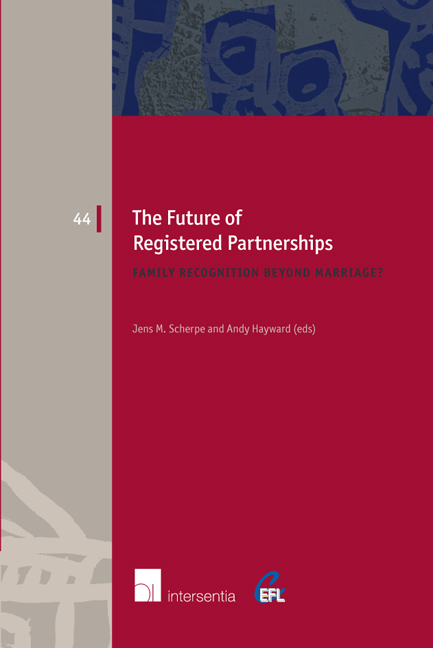Book contents
- Frontmatter
- Foreword
- Preface
- Contents
- List of Contributors
- The Future of Registered Partnerships: An Introduction
- Questionnaire
- Part I Registered Partnerships as a Functional Equivalent to Marriage
- Part II Registered Partnerships as an Alternative to Marriage
- Part III Registered Partnerships in a Time of Transition
- Part IV Alternative Models for Registered Partnerships: Beyond Conjugality, Beyond Formality
- Part V Registered Partnerships, Discrimination and Human Rights
- Part VI Comparative Perspective and Conclusions
- The Future of Civil Partnership in England and Wales
- The Past, Present and Future of Registered Partnerships
- Index
- European Family Law Series
The Future of Civil Partnership in England and Wales
from Part VI - Comparative Perspective and Conclusions
Published online by Cambridge University Press: 22 September 2018
- Frontmatter
- Foreword
- Preface
- Contents
- List of Contributors
- The Future of Registered Partnerships: An Introduction
- Questionnaire
- Part I Registered Partnerships as a Functional Equivalent to Marriage
- Part II Registered Partnerships as an Alternative to Marriage
- Part III Registered Partnerships in a Time of Transition
- Part IV Alternative Models for Registered Partnerships: Beyond Conjugality, Beyond Formality
- Part V Registered Partnerships, Discrimination and Human Rights
- Part VI Comparative Perspective and Conclusions
- The Future of Civil Partnership in England and Wales
- The Past, Present and Future of Registered Partnerships
- Index
- European Family Law Series
Summary
INTRODUCTION
Over the past 20 years, the introduction of registered partnerships has become a prominent and, in many instances, controversial political issue for governments and legislatures across Europe. As a formalised relationship structure, registered partnerships have a problematic interaction with the much more established and revered status of marriage. In this respect, it is frequently questioned whether the presence of registered partnerships undermines that institution and whether such unions overly complicate the legal distinctions between formal and nonformalised relationships like cohabitation. Moreover, this controversial interface with marriage becomes even more apparent owing to the widespread use of registered partnerships as a mechanism to give legal recognition to same-sex relationships, oft en as a precursor to the introduction of same-sex marriage. In that respect, registered partnerships become highly contested as representing a mere ‘stepping-stone’ to marriage or as a ‘second-class’ institution.
As demonstrated in the preceding chapters, the specific approach taken by different jurisdictions to the future of registered partnerships is highly varied. However, at a general level and based on past practice, the future of this relationship form is oft en determined by whether the scheme was introduced specifically for same-sex couples as a precursor to marriage or was open to all couples from its inception as an alternative to marriage. In the former situation, the registered partnership regime is phased out after the introduction of samesex marriage in a particular jurisdiction (the Nordic Model); whereas in the latter one, the scheme is retained as its foundational purpose – as an alternative to, and not a substitute for, marriage – endures (the Dutch Model).
This chapter analyses the options and reform opportunities available to England and Wales for its form of registered partnership regime, the civil partnership. The aim of this chapter is not to focus on the past or the motivations behind the introduction of civil partnerships but instead to consider their future. As the same-sex specific civil partnership regime under the Civil Partnership Act 2004 was not abolished following the introduction of same-sex marriage in 2014, this jurisdiction has now departed from the Nordic Model. Furthermore, with pressure for reform currently being exerted by opposite-sex couples that are presently denied access to civil partnerships, there is now much greater engagement with the conception of partnerships as alternatives to marriage, as seen in the Netherlands, New Zealand and France.
- Type
- Chapter
- Information
- The Future of Registered PartnershipsFamily Recognition Beyond Marriage?, pp. 527 - 560Publisher: IntersentiaPrint publication year: 2017



